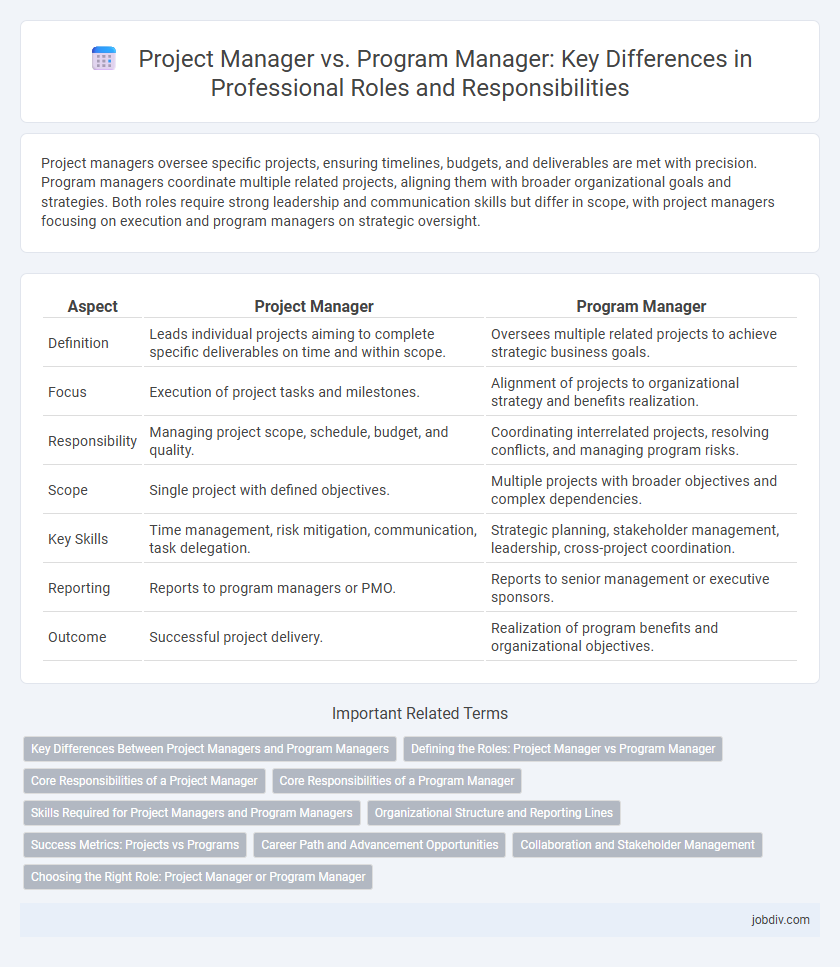Project managers oversee specific projects, ensuring timelines, budgets, and deliverables are met with precision. Program managers coordinate multiple related projects, aligning them with broader organizational goals and strategies. Both roles require strong leadership and communication skills but differ in scope, with project managers focusing on execution and program managers on strategic oversight.
Table of Comparison
| Aspect | Project Manager | Program Manager |
|---|---|---|
| Definition | Leads individual projects aiming to complete specific deliverables on time and within scope. | Oversees multiple related projects to achieve strategic business goals. |
| Focus | Execution of project tasks and milestones. | Alignment of projects to organizational strategy and benefits realization. |
| Responsibility | Managing project scope, schedule, budget, and quality. | Coordinating interrelated projects, resolving conflicts, and managing program risks. |
| Scope | Single project with defined objectives. | Multiple projects with broader objectives and complex dependencies. |
| Key Skills | Time management, risk mitigation, communication, task delegation. | Strategic planning, stakeholder management, leadership, cross-project coordination. |
| Reporting | Reports to program managers or PMO. | Reports to senior management or executive sponsors. |
| Outcome | Successful project delivery. | Realization of program benefits and organizational objectives. |
Key Differences Between Project Managers and Program Managers
Project Managers oversee specific projects with defined scopes, schedules, and budgets, ensuring deliverables meet quality standards and stakeholder expectations. Program Managers coordinate multiple related projects, aligning them with broader organizational goals and managing interdependencies to optimize resource allocation and strategic benefits. The key differences lie in scope complexity, focus on individual project execution versus strategic program oversight, and the level of influence on organizational objectives.
Defining the Roles: Project Manager vs Program Manager
Project Managers are responsible for executing specific projects within defined scopes, budgets, and timelines, ensuring deliverables meet quality standards. Program Managers oversee multiple related projects, aligning them with broader business objectives while managing cross-project dependencies and resource allocation. Clear differentiation in these roles supports optimized project delivery and strategic alignment in complex organizational environments.
Core Responsibilities of a Project Manager
A Project Manager is responsible for planning, executing, and closing projects within defined scope, time, and budget constraints while ensuring quality deliverables. They coordinate cross-functional teams, manage resources, and mitigate risks to achieve specific project goals. Monitoring progress through key performance indicators (KPIs) and maintaining stakeholder communication are critical to the Project Manager's core duties.
Core Responsibilities of a Program Manager
A Program Manager oversees multiple related projects, ensuring alignment with organizational goals and strategic objectives by managing interdependencies and resource allocation across teams. They focus on long-term deliverables, stakeholder communication, risk management, and benefit realization throughout the program lifecycle. Their core responsibilities include coordinating cross-project activities, maintaining program governance, and driving continuous improvements to maximize overall program value.
Skills Required for Project Managers and Program Managers
Project managers require strong skills in scope management, risk assessment, time allocation, and stakeholder communication to deliver specific project objectives efficiently. Program managers need advanced capabilities in strategic planning, cross-project coordination, resource management, and leadership to oversee multiple related projects and align them with organizational goals. Both roles demand proficiency in communication, problem-solving, and decision-making but differ in their scope and scale of responsibility.
Organizational Structure and Reporting Lines
Project Managers typically report to Program Managers or functional managers within a hierarchical organizational structure, overseeing specific projects with defined scopes and timelines. Program Managers operate at a higher organizational level, coordinating multiple related projects to ensure strategic alignment and resource optimization across the program. The reporting lines emphasize that Project Managers focus on tactical execution, while Program Managers handle strategic oversight and cross-project integration.
Success Metrics: Projects vs Programs
Project managers measure success by specific deliverables, timelines, budgets, and stakeholder satisfaction within individual projects. Program managers evaluate success through broader organizational impact, alignment with strategic goals, benefits realization, and sustained value across multiple interconnected projects. Effective differentiation in success metrics ensures precise performance tracking and resource allocation for both roles.
Career Path and Advancement Opportunities
Project Managers typically advance by deepening expertise in specific industries or methodologies, often progressing to Senior Project Manager or PMO Lead roles, while Program Managers oversee multiple projects and evolve into roles like Portfolio Manager or Program Director, emphasizing strategic leadership. Program Management demands broader organizational impact and cross-functional coordination, making it a natural pathway to executive positions such as Chief Operating Officer (COO) or VP of Operations. Career advancement for both roles benefits significantly from certifications like PMP, PgMP, and strong leadership skills that align with organizational growth objectives.
Collaboration and Stakeholder Management
Project Managers focus on coordinating specific projects by aligning team members' tasks and managing project-specific stakeholders to ensure deliverables meet scope, time, and budget constraints. Program Managers oversee multiple related projects, driving strategic alignment across teams and fostering collaboration among various stakeholders to achieve broader organizational objectives. Effective stakeholder management for Program Managers involves balancing diverse interests and facilitating communication between project teams, executives, and external partners.
Choosing the Right Role: Project Manager or Program Manager
Choosing the right role between Project Manager and Program Manager depends on the scope and strategic impact of responsibilities; Project Managers focus on specific, time-bound deliverables with defined objectives, while Program Managers oversee multiple related projects to achieve broader organizational goals. Assessing career aspirations, leadership skills, and preference for tactical versus strategic involvement helps determine the optimal fit. Understanding these distinctions enables individuals to align their expertise with the demands of either managing individual project execution or coordinating complex program outcomes.
Project Manager vs Program Manager Infographic

 jobdiv.com
jobdiv.com